- Home
- Harlan Coben
The Final Detail: A Myron Bolitar Novel Page 6
The Final Detail: A Myron Bolitar Novel Read online
Page 6
“Fine.”
“Do you need anything?”
“No.”
Myron was not sure how to continue, what subject to broach or how to broach it. Once again Esperanza took the ball and started dribbling.
“So are you and Jessica through?” she asked.
“Yes.” It was the first time he had said it out loud. It felt weird.
That made her smile, big time. “Ah, the silver lining,” she said triumphantly. “So it’s really over? Queen Bitch is gone for good?”
“Don’t call her that.”
“Is she gone for good?”
“I think so.”
“Say yes, Myron. It’ll make you feel better.”
But he couldn’t. “I’m not here to talk about me.”
Esperanza crossed her arms, said nothing.
“We’ll get you out of this,” he said. “I promise.”
She nodded, still playing casual; if she were a smoker, she’d be blowing rings. “You better get back to the office. We’ve already lost too many clients.”
“I don’t care about that.”
“I do.” Her voice had an edge now. “I’m a partner now.”
“I know that.”
“So I own part of MB SportsReps. If you want to self-destruct, fine. But don’t drag my lusted-after ass down with you, okay?”
“I didn’t mean it like that. I just meant we’ve got bigger worries right now.”
“No.”
“What?”
“We don’t have bigger worries. I want you to stay out of this.”
“I don’t understand.”
“I have one of the top criminal defense attorneys in the country working on my case. Let her handle it.”
Myron tried to let her words settle in, but they were like unruly children after a sugar fix. He leaned forward a bit.
“What’s going on here?”
“I can’t talk about it.”
“What?”
“Hester told me I shouldn’t talk about the case with anyone, even you. Our conversations are not protected.”
“You think I’d tell?”
“You can be forced to testify.”
“So I’d lie.”
“You won’t have to.”
Myron opened his mouth, closed it, tried again. “Win and I can help here. We’re good at this.”
“No offense, Myron, but Win is psycho. I love him, but his kind of help I don’t need. And you”—Esperanza stopped, looked up, unfolded her arms, lowered her gaze back to his—“you’re damaged goods. I don’t blame you for running away. It was probably the right thing to do. But let’s not pretend you’re back to normal.”
“Not normal,” he agreed. “But I’m ready for this.”
She shook her head. “Concentrate on MB. It’s going to take all your efforts to keep her afloat.”
“You’re not going to tell me what happened?”
“No.”
“That doesn’t make any sense.”
“I just spelled out the reasons—”
“You’re really afraid I’d testify against you?”
“I didn’t say that.”
“So what is it? If you think I’m not up for this, okay, maybe I buy it. But that wouldn’t stop you from talking to me. In fact, you’d probably tell me just to keep me from poking around. So what’s going on here?”
Her face slid closed. “Go to the office, Myron. You want to help? Save our business.”
“Did you kill him?”
He regretted it the moment the words came out of his mouth. She looked at him as if he’d just reached across the table and slapped her face.
“I don’t care if you did,” he pressed on. “I’ll stand by you no matter what. I want you to know that.”
Esperanza regained her composure. She slid her chair back and stood. For a few moments she stared at him, studying his face as though searching for something that was normally there. Then she turned away, called for the guard, and left the room.
CHAPTER
9
Big Cyndi was already manning the reception desk when Myron reached the offices of MB SportsReps. They had a prime location, right smack on Park Avenue in midtown. The Lock-Horne high-rise had been owned by Win’s family since Great-Great-Et-Cetera Grandpa Horne (or was it Lockwood?) had torn down a tepee and started building it. Myron rented space at a premium discount from Win. In return Win handled all the finances for Myron’s clients. This deal was a bargain for Myron. Between the primo address and the ability to guarantee his clients the financial services of the near-legendary Windsor Horne Lockwood III, MB SportsReps had an air of legitimacy few small firms could boast.
MB SportsReps was on the twelfth floor. An elevator opened directly into their reception room. Muy classy. The phones were beeping. Big Cyndi put people on hold and looked up at him. She looked even more ridiculous than usual. No easy task. In the first place, the furniture was too small for her, the desk legs actually teetering on her knees like something a father might experience when visiting his child’s elementary school. In the second place, she still had not washed up or changed from last night. Normally Myron, the image-conscious entrepreneur, would comment on this, but now did not seem an appropriate (or safe) time.
“The press is pulling out all the tricks to get up here, Mr. Bolitar.” Big Cyndi always called him Mr. Bolitar. She liked formalities. “Two of them even pretended to be prospective clients coming out of Division One schools.”
Myron was hardly surprised. “I told the guard downstairs to be extra wary.”
“A lot of clients are calling too. They’re concerned.”
“Patch them through. Get rid of everybody else.”
“Yes, Mr. Bolitar.” Like she wanted to salute. Big Cyndi handed him a pile of blue slips. “These are this morning’s calls from clients.”
He started thumbing through the stack.
“For your information,” Big Cyndi continued, “we told everyone you were just gone for a day or two at first. Then a week or two. Then we started faking emergencies for you: family illnesses, helping a sick client, that sort of thing. But some clients got tired of the excuses.”
He nodded. “You have a list of who left us?”
It was already in her hand. She handed it to him, and he started toward his office.
“Mr. Bolitar?”
He turned. “Yes?”
“Will Esperanza be okay?”
Again the tiny, distant voice belied her bulk, as though the looming form in front of him had swallowed a small child and the small child were now calling for help. “Yes, Big Cyndi. She’ll be fine.”
“You’ll help her, won’t you? Even though she doesn’t want you to?”
Myron gave her a half nod. That didn’t seem to satisfy her. So he said, “Yes.”
“Good, Mr. Bolitar. That’s the right thing to do.”
He had nothing to add to that so he entered his inner office. Myron had not been to MB in six weeks. Strange. He had worked so hard and so long to build up MB SportsReps—M for Myron, B for Bolitar, snappy name, no?—and he had just abandoned her. Just like that. Abandoned his business. And his clients. And Esperanza.
The renovations had been completed—they’d sliced a bit of space out of the conference room and reception area so that Esperanza could have an office of her own—but the new room remained unfurnished. So Esperanza had been using his office. He sat at his desk and immediately the phone started ringing. He ignored it for a few seconds, his eyes latched on the client wall, the one with action photos of all the athletes MB represented. He zeroed in on Clu Haid’s image. Clu was on the pitcher’s mound, leaning forward, about to go into a stretch, his cheek bulging with tobacco chaw, his eyes squinting at a sign he would undoubtedly shake off.
“What did you do this time, Clu?” he said out loud.
The photo didn’t reply, which was probably a good thing. But Myron continued to stare. He had pulled Clu out of so many jams over the years that
he had to wonder: If he had not run off to the Caribbean, would he have been able to pull Clu out of this one too?
Useless introspection—one of Myron’s many talents.
Big Cyndi buzzed him. “Mr. Bolitar?”
“Yes.”
“I know you told me to only patch through clients, but Sophie Mayor is on the line.”
Sophie Mayor was the new owner of the Yankees.
“Put her through.” He heard a click and said hello.
“Myron, my God. What the hell is going on here?” Sophie Mayor wasn’t big on chitchat.
“I’m still trying to sort it out myself.”
“They think your secretary killed Clu.”
“Esperanza is my partner,” he corrected, though he was not sure why. “And she didn’t kill anyone.”
“I’m sitting here with Jared.” Jared was her son and the “co-general manager” of the Yankees—co meaning shares the title with someone who knows what he’s doing because he got the job through nepotism. Jared meaning born after 1973. “We need to tell the press something.”
“I’m not sure how I can help, Ms. Mayor.”
“You told me Clu was past all this, Myron.”
He said nothing.
“The drugs, the drinking, the partying, the trouble,” Sophie Mayor continued. “You said it was in the past.”
He was about to defend himself but thought better of it. “I think it’s better if we talk about all this in person,” Myron said.
“Jared and I are on the road with the team. We’re in Cleveland right now. We’re flying home tonight.”
“How about tomorrow morning then?”
“We’ll be at the stadium,” she said. “Eleven o’clock.”
“I’ll be there.”
He hung up the phone. Big Cyndi immediately put through a client call.
“Myron here.”
“Where the hell have you been?”
It was Marty Towey, a defensive tackle for the Vikings. Myron took a deep breath and let loose his semiprepared oration: he was back, things were great, don’t worry, the financials are terrific, got the new contract right here, busy securing new endorsements, blah, blah, soothe, soothe.
Marty was a tough sell. “Dammit, Myron, I chose MB because I didn’t want underlings handling me. I wanted to deal with the big boss. You know what I’m saying?”
“Sure, Marty.”
“Esperanza’s nice and all. But she ain’t you. I hired you. Do you understand?”
“I’m back now, Marty. Everything is going to be fine, I promise. Look, you guys are in town in a couple of weeks, right?”
“We play the Jets in two weeks.”
“Great. So I’ll meet you at the game and we’ll go out to dinner afterward.”
When Myron hung up, it dawned on him that he’d been so uninvolved in his clients’ affairs that he didn’t even know if Marty was playing at an All-Pro level or nearly waived. Christ, he had a lot of catching up to do.
The calls went on in a similar vein for the next two hours. Most clients were assuaged. Some sat on the fence. No additional ones left him. He had not fixed anything, but he had managed to lessen the blood flow to a serious trickle.
Big Cyndi knocked and opened the office door. “Trouble, Mr. Bolitar.”
An awful, though not unfamiliar, stench started emanating from the doorway.
“What the hell …?” Myron began.
“Out of the way, hot stuff.” The gruff voice came from behind Big Cyndi. Myron tried to see who it was, but Big Cyndi blocked his line of vision like a solar eclipse. Eventually she yielded, and the same two plainclothes officers from the courthouse hurried past her. The big one was fiftyish, bleary-eyed, world-weary and had the kind of face that looked unshaven even after a shave. He wore a trench coat with sleeves that barely reached his elbows and shoes that had more scuff marks than a Gaylord Perry baseball. The smaller guy was younger and really, well, ugly. His face reminded Myron of a magnified photo of head lice. He wore a light gray suit with vest—the Sears Casual Law Enforcer—and one of those Looney Tunes ties that screamed 1992.
The awful smell started permeating the walls.
“A warrant,” the big guy groused. He wasn’t chewing on a cigar, but he should have been. “And before you tell me we’re out of our jurisdiction, we’re still working with Michael Chapman, Manhattan North. Call him, you got a problem. Now get out of the chair, asshole, so we can search this place.”
Myron crinkled his nose. “Jesus, which one of you is wearing the cologne?”
Head Lice gave a quick look toward his partner. The look said, Hey, I’ll take a bullet for this guy, but I’m not taking the fall for that smell. Understandable.
“Listen up, dip shit,” the big one said. “My name is Detective Winters—”
“Really? Your mother named you Detective?”
Barely a sigh. “—and this is Detective Martinez. Move out here now, dim wad.”
The smell was getting to him. “Yo, Winters, you got to stop borrowing cologne from male flight attendants.”
“Keep at it, funnyman.”
“Seriously, does the label include the words glaze liberally!”
“You’re a real comedian, Bolitar. So many bad asses are funny it’s a pity they don’t televise Sing Sing.”
“I thought you already searched the place.”
“We did. Now we’re back for the financials.”
Myron pointed to Head Lice. “Can’t he do it alone?”
“What?”
“I’ll never get the smell out of here.”
Winters took out a pair of latex gloves, this so as not to mess up possible fingerprints. He snapped them on in dramatic fashion, including finger wiggling, and grinned.
Myron winked. “You want me to bend down and grab my ankles?”
“No.”
“Dang, and me needing a date.” Want to needle a cop? Use gay humor. Myron had yet to meet one who wasn’t a complete homophobe.
Winters said, “We’re going to trash this place, funnyman.”
“Doubtful,” Myron countered.
“Oh?”
Myron stood, reached into the file cabinet behind him.
“Hey, you can’t touch anything in here.”
Myron ignored him, pulled out a small videocamera. “Just keeping a record of your doings, officer. In today’s climate of false police corruption charges, we wouldn’t want any misunderstandings”—Myron snapped on the camera and aimed the lens at the big guy—“would we?”
“No,” the big guy said, staring straight into the lens. “We wouldn’t want any misunderstandings.”
Myron kept his eye in the viewer. “The camera captures the real you, Detective. I bet if we played it back, we’d still smell your cologne.”
Head Lice hid a smile.
“Please get out of our way, Mr. Bolitar,” Winters said.
“Sure thing. Cooperation is my middle name.”
They began the search, which basically consisted of packing every document they could lay their hands on in crates and carrying them out. The gloved hands touched everything, and it felt to Myron like they were touching him. He tried to look innocent—whatever that looked like—but he couldn’t help being nervous. Guilt was a funny thing. He knew that there was nothing amiss in any of the files, but he still felt oddly defensive.
Myron gave the video camera to Big Cyndi and started making calls to clients who had left MB. Most didn’t pick up. The few who did tried to defect. Myron played it soft, figuring that any overaggression would backfire. He merely told them that he was back and would like very much to speak with them at their earliest convenience. A lot of hemming and hawing from those who actually spoke to him. Not unexpected. If he were to regain their confidence, it would take time.
The cops finished up and left without so much as a good-bye. Manners. Big Cyndi and Myron watched the elevators close.
“This is going to be very difficult,” Myron said.
; “What?”
“Working without any files.”
Big Cyndi opened her purse and showed him computer disks. “Everything is on these.”
“Everything?”
“Yes.”
“You backed up everything on these?”
“Yes.”
“Letters and correspondences, okay, but I need the contracts—”
“Everything,” she said. “I bought a scanner and ran every paper in the office through it. There’s a backup set in a safety-deposit box at Citibank. I update the disks every week. In case of fire or other emergency.”
When she smiled this time, Myron’s cringe was barely perceptible.
“Big Cyndi, you are a surprising woman.”
It was hard to tell under the melted Masque de Crayola, but it almost looked like she was blushing.
The intercom buzzed. Big Cyndi picked up the phone.
“Yes?” Pause. Then her voice grew grave.
“Yes, send her up.” She replaced the receiver.
“Who is it?”
“Bonnie Haid is here to see you.”
Big Cyndi showed the Widow Haid into his office. Myron stood behind his desk, not sure what to do. He waited for her to make the first move, but she didn’t. Bonnie Haid had let her hair grow out, and for a moment he was back at Duke. Clu and Bonnie were sitting on the couch in the basement of the frat house, another major kegger behind them, his arm draped over her shoulder, she wearing a gray sweatshirt, her legs tucked under her.
He swallowed and moved toward her. She took a step back and closed her eyes. She put a hand up to stop him as though she could not bear the pain of his intimacy. Myron stayed where he was.
“I’m sorry,” he said.
“Thank you.”
They both stood there, two dancers waiting for the music to begin.
“Can I sit down?” Bonnie asked.
“Of course.”
She sat. Myron hesitated and then chose to go back around his desk.
“When did you get back?” she asked.
“Last night,” he said. “I didn’t know about Clu before then. I’m sorry I wasn’t here for you.”
Bonnie cocked her head. “Why?”
“Pardon?”
“Why are you sorry you weren’t here? What could you have done?”

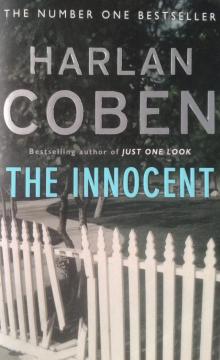 The Innocent
The Innocent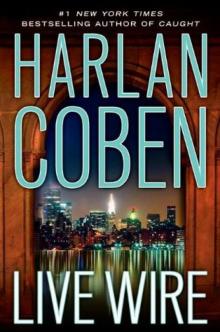 Live Wire
Live Wire Play Dead
Play Dead Drop Shot
Drop Shot Seconds Away
Seconds Away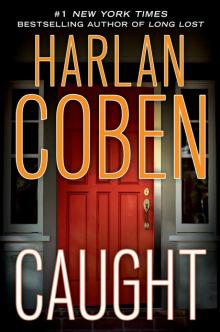 Caught
Caught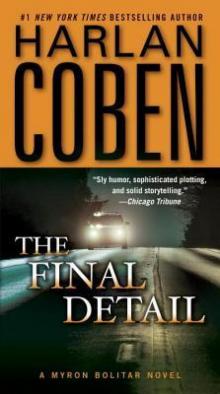 The Final Detail
The Final Detail Fade Away
Fade Away Home
Home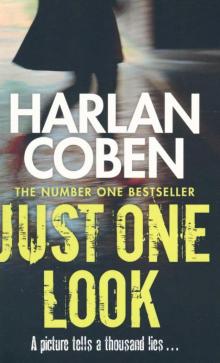 Just One Look
Just One Look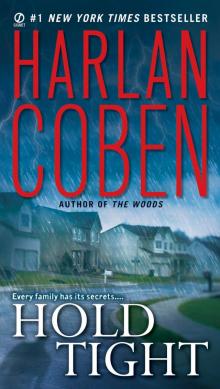 Hold Tight
Hold Tight Fool Me Once
Fool Me Once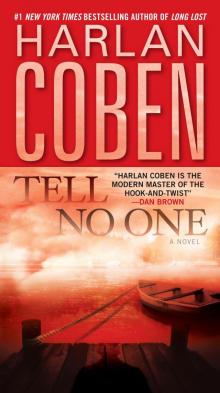 Tell No One
Tell No One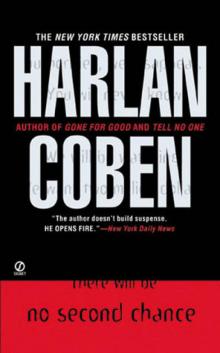 No Second Chance
No Second Chance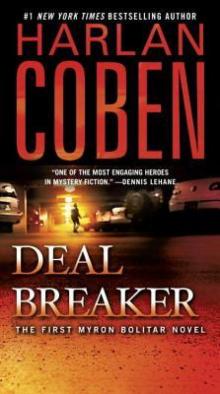 Deal Breaker
Deal Breaker Long Lost
Long Lost One False Move
One False Move The Woods
The Woods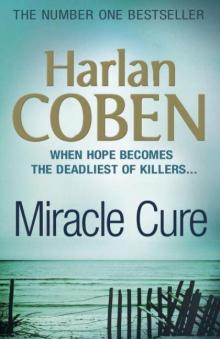 Miracle Cure
Miracle Cure Found
Found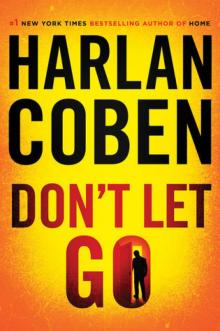 Don't Let Go
Don't Let Go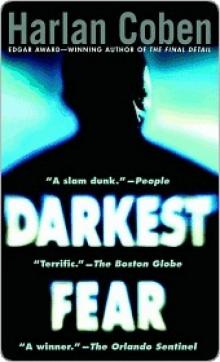 Darkest Fear
Darkest Fear The Stranger
The Stranger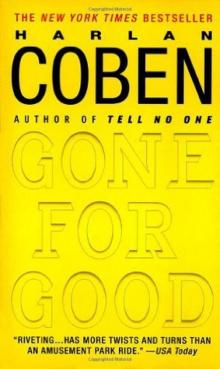 Gone for Good
Gone for Good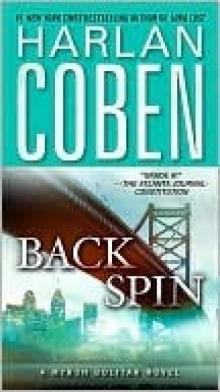 Back Spin
Back Spin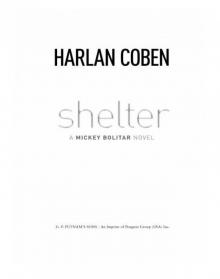 Shelter
Shelter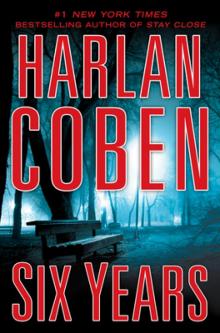 Six Years
Six Years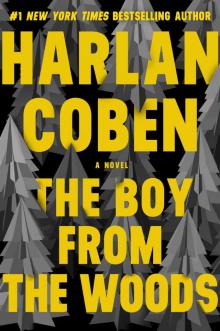 The Boy from the Woods
The Boy from the Woods Missing You
Missing You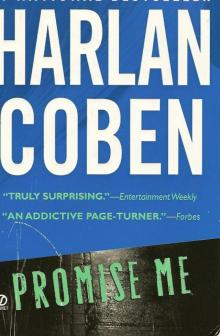 Promise Me mb-8
Promise Me mb-8 The Final Detail: A Myron Bolitar Novel
The Final Detail: A Myron Bolitar Novel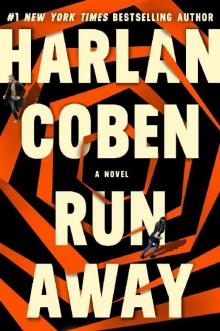 Run Away
Run Away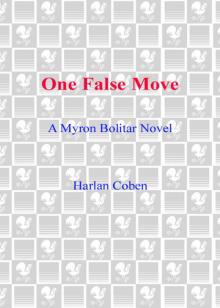 One False Move: A Myron Bolitar Novel
One False Move: A Myron Bolitar Novel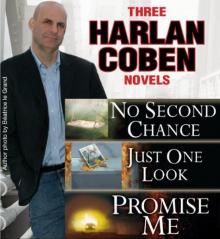 Three Harlan Coben Novels
Three Harlan Coben Novels the Woods (2007)
the Woods (2007) Tell No One (2001)
Tell No One (2001) the Innocent (2005)
the Innocent (2005)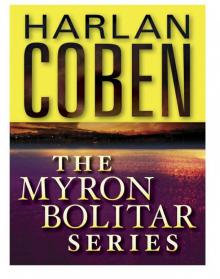 The Myron Bolitar Series 7-Book Bundle
The Myron Bolitar Series 7-Book Bundle Gone for Good (2002)
Gone for Good (2002) Caught (2010)
Caught (2010) Hold Tight (2008)
Hold Tight (2008)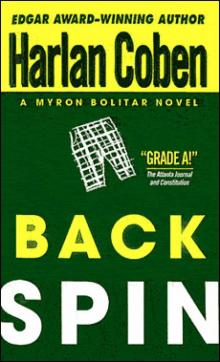 04 - Back Spin
04 - Back Spin Miracle Cure (1991)
Miracle Cure (1991) Harlan Coben 3 Novel Collection
Harlan Coben 3 Novel Collection Just One Look (2004)
Just One Look (2004)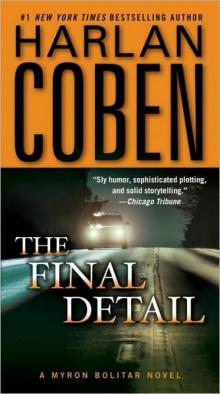 The Final Detail mb-6
The Final Detail mb-6 Play Dead (2010)
Play Dead (2010)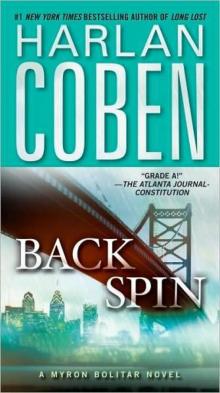 Back Spin mb-4
Back Spin mb-4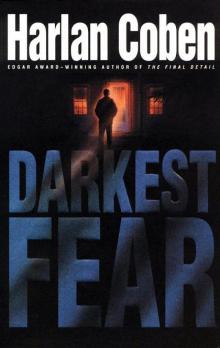 Darkest Fear mb-7
Darkest Fear mb-7